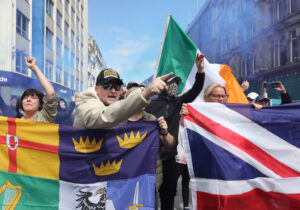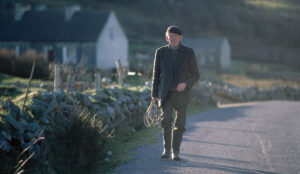If you were to judge a country by the grim piety of its journalistic depictions, you’d swear Northern Ireland were one big funeral, begetting nothing but more funerals and all of us professional keeners. It’s not that the region isn’t beleaguered, by both design and neglect. It’s more that this abstracted view is incomplete. It’s a distancing, a containment, a denial.
In the opening seconds of Kneecap’s new film, the old cliches we all carry about Northern Ireland are swiftly dispensed. Car bombs, graffiti on gable walls, checkpoints, border signs, Molotov cocktails, barely pubescent British army cannon fodder, hoovered up from Brixton to the Gorbals, kneeling with their rifles on street corners while ragged kids gather round them. If they were following the prevailing models of film in the North of Ireland, as they put it, the movie would be more dewy-eyed trauma porn. People don’t live like that though, not all the time, and even when they are forced to, innate resistances begin.
Kneecap is an inventive, picaresque, often hilarious, fictionalised origin story of the Irish hip-hop trio. It’s defiant in subject and form, rejecting the kitchen-sink misery or Stage Oirish paddywhackery usually demanded of the Irish, while simultaneously flirting with and subverting these modes. The irreverence itself is political, given Northern Ireland was a place where false piety was weaponised by every side to damn the other and whitewash themselves. But the band, and film, embrace the farcical nature of the post-Troubles North with a playful defiance. When the Belfast writer Louis MacNeice wrote of “being various”, it didn’t just mean virtuous things. It is our best and worst sides, and this film shows them, taking place in a contemporary world of dead-end jobs, k-holes and breakbeats rather than newsreels from the Seventies and Eighties.
They go for all the sacred cows of Norn Iron — the PSNI and the British State, philistine Unionists, Republicans who abandon their familial responsibilities and switch to new-age beliefs, anti-drug vigilantes who end up with drug dealers working for them, all the petty lords of their particular fiefdoms. Even tedious Gaelic teachers come in for a bruising, particularly as there’s no excuse for making such a mercurial language boring (“May the lowest stone in the sea be on top of your head” is one memorable line in a film bursting with them). Full of healthy self-ridicule, the irreverence is radical because reverence, as Northern Ireland has shown, is the first step on the road to solipsism, corruption, essentialism and eventually hell.
More than anything, Kneecap the film and the band are concerned with the present, which has long been squandered in the North of Ireland. People chose or were forced to live anywhere but the present. Republicans, for example, were obsessed with the future. Their favourite slogan was/is Tiocfaidh ár lá meaning “Our day will come”. After the Brighton bomb killed five people, the IRA released a statement: “Today we were unlucky, but remember we only have to be lucky once — you will have to be lucky always.” There was always a suitably opaque sense of the utopia of a future United Ireland, which untested could become any fantasy the imagination could conjure, rather than what it would and will be — the end of one set of colonial troubles and, after the inevitable sesh, the beginning of a new self-inflicted set of troubles.
Meanwhile, both sides of the divide remain obsessed with the past — King Billy, the Hunger Strikers, the Apprentice Boys, the Easter Rebels… One side trapped and deluded in triumphalism, the other in martyrdom and magical thinking. Catholics could console themselves that the future belonged to them via demographic replacement, something Unionists such as Paisley (“they breed like rabbits and multiply like vermin”) obsessed over. On the other side, Loyalist siege mentality gave way to paranoia and a zero-sum game, whereby a job or house for “one of them” is “one less for us”. This mentality has fuelled a race to the bottom, with the main difference in their deprived neighbourhoods being the colour of the kerbstones and bunting. It is this betrayal of the present, the neurosis of trying to exist in the past and future, that Kneecap reject with a film and discography that are manifestly about the only place we ever inhabit — the now.
What is the present that Kneecap and their generation face in Northern Ireland? Back home this month, I found mixed signals. There’s lots of talk of (parts of) Belfast buzzing with young professionals drinking London-priced drinks and the inflated cost of property. Beyond this bubble, things are different. Poverty and disaffection flourish in inverse proportion to opportunity. Escape comes mostly in the form of criminality, drink, hard drug use and abuse. Communities are beset by paramilitaries turned gangsters and the police are mistrusted by both sides. Minimum wage jobs and food banks are standard. In many places, someone who’d be an entrepreneur somewhere else, somewhere more functional, ends up a dealer. The communities are still largely segregated, beginning at primary school.
All along the north coast, there are endless paramilitary flags, a tent revival, a drive-in gospel service, even a fence upon which a man was crucified by loyalist paramilitaries a few months ago. There are few signs of any post-Troubles Enlightenment and, in working-class areas where I grew up, few signs of there being a post-Troubles. Even the great symbol of Belfast, the Samson and Goliath shipyard cranes, is one of post-industrial decline. It’s certainly better to live in farce rather than tragedy, and the Peace Process was hard-earned and vital, however flawed, but worryingly it feels like suspended animation. The idea that tourism and investment would save us was always suspect because it’s not capitalism’s primary purpose to do so. The idea that integration, economic justice and eventually real peace could occur is hamstrung by the many politicians and religious figures who benefit from division, paralysis and bad faith.
No wonder, there is such an anarchic element to the likes of Kneecap. Who could blame them for wanting more? “A free Ireland,” one of Kneecap’s heroes, James Connolly, claimed, “will control its own destiny from the plough to the stars.” By contrast, the least one could hope for is some agency over their own life.
It takes a movie this intentionally juvenile to signal a newfound maturity in Northern Irish film. Kneecap takes the tropes and ciphers and turns them inside out, it deflects the gaze back at itself. Cheap moralism and sentimentality are dispensed with, in favour of something more reflexive. There’s little doubt where the trio’s allegiances lie, with the “Northern” scored out on signs of “Northern Ireland”.
Yet the fact that they are scathing about so many things, in an impish way, the fact that they arouse the ire of so many — including the UK government, the DUP, the UUP and even the mild-mannered Alliance Party — is a sign they are treading where the sanctimonious rarely dare. And their attitude of “show, don’t tell” is remarkably effective, as exemplified by their use of the Irish language. With an indigenous language vanishing at a pace of almost two a month, there’s the temptation to give in to sanctimony and lecture the world about “To hell or Connacht”, hedge schools, the Famine and the real reason so many people speak English around the world. Kneecap choose instead to help Irish survive by simply allowing it to breathe or, as they put it, letting the dodo out of the glass. The film is also a testament to working-class DIY culture, which because of the state of mainstream culture here, now a playground for the vacuous progeny of the rich, may be our only source of hope.
There are those who have taken umbrage with the band. The trio has been condemned by politicians and the media, many of whom have profited from how dysfunctional the North has been while denouncing those who dare to speak the truth. If Kneecap represent disorder, indecency, abnormality, it might be worth considering what order, decency and normality have looked like for the hundred years of Northern Ireland’s existence. Rejecting the archetypes one by one, refusing to migrate to survive, insisting on creating something organically from the ground up themselves, Kneecap have found a path where they were told there was none. They have made their own hope and it’s a raucous but exciting thing. They convincingly demonstrate that laughter is never a singular thing. It can mean and contain multitudes — joy, mockery, self-deprecation, relief, even the crazed elation of having nothing to lose.
Disclaimer
Some of the posts we share are controversial and we do not necessarily agree with them in the whole extend. Sometimes we agree with the content or part of it but we do not agree with the narration or language. Nevertheless we find them somehow interesting, valuable and/or informative or we share them, because we strongly believe in freedom of speech, free press and journalism. We strongly encourage you to have a critical approach to all the content, do your own research and analysis to build your own opinion.
We would be glad to have your feedback.
Source: UnHerd Read the original article here: https://unherd.com/



